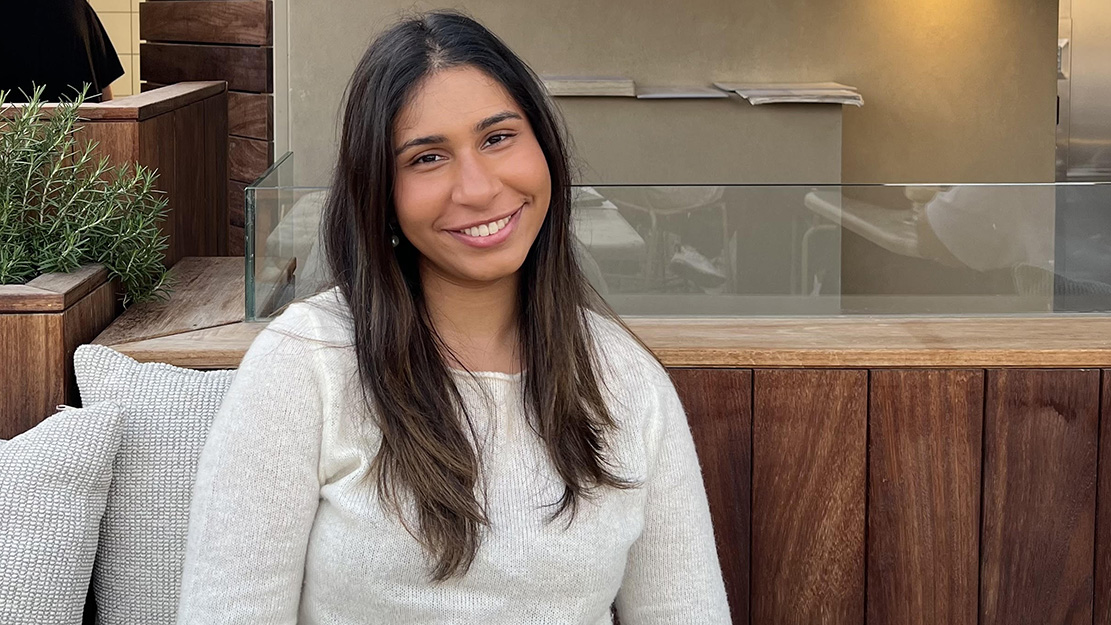More Than an Observer: Philosophy, Politics, and Economics Major Nikita Kale ’25 Takes Action to Solve Big Global Problems
April 08, 2024

Kale, who founded The Observer UMD publication, has held multiple legislative positions and currently interns at Tesla in D.C.
By Jessica Weiss ’05
When Nikita Kale arrived at the University of Maryland in 2021 and found there was no student publication focused on politics, she wondered: why not create one herself?
The philosophy, politics, and economics (PPE) major recruited fellow students in the Honors Humanities living-learning program to serve as editors and writers, and Honors Humanities Associate Director Sarah Bonnie Humud to advise them. In the span of weeks, she crafted a mission statement, registered as a student organization at Stamp and designed a website on her own.
Three years later, The Observer UMD has published some 70 different writers from departments and majors across campus, reaching thousands of readers with articles about topics in the arts, literature and language, economics, history, culture and more. Kale, a Banneker/Key Scholar who is also studying international business, is the editor-in-chief.
“It’s been a really exciting, rewarding thing to be part of,” said Kale, now a junior. “I’m so proud of the community we’ve created and the discourse we’re fostering.”
Humud called Kale’s leadership and dedication remarkable: “Under her guidance, The Observer has become a dynamic platform for students to engage in meaningful discussions on pressing political issues,” she said. “Nikita’s tireless efforts have not only enriched the intellectual landscape at UMD but have also empowered her peers to become more active and informed citizens.”
Heading the publication is among the various ways that Kale has immersed in politics and political ideas at UMD. Beyond her classes, she credits the campus’ location close to the nation’s capital with allowing her to take her major “out of the classroom,” through a variety of internships.
“There are so many things that I am interested in, and it’s been important to me to have a varied experience,” she said. “I’ve found that’s really possible at UMD and in ARHU.”
Kale grew up in Howard County and always knew she wanted to study close to D.C. She was drawn to the PPE major, which launched at UMD in Fall 2019 and is housed in the Department of Philosophy, for its interdisciplinary approach. A discipline first established at Oxford University in the 1920s, PPE aims to give students tools and methods from three different disciplines (philosophy, political science and economics) and use those tools to respond to the world’s most complex problems.
Kale had never taken a philosophy class before UMD, but immediately loved the way it helped her think about and discuss problems. She especially enjoyed “Social Philosophy and Political Economy” which she said transformed the way she both thinks and writes. The course examines capitalism and socialism through several different theoretical lenses, and ultimately explores which is more just.
“I really loved taking huge, complex theories and problems and deconstructing them,” she said. “Being able to read and write with that level of complexity is going to serve me so much going forward.”
In 2022, she held two legislative internships, first in the Maryland General Assembly with District 18 Representative Emily Shetty, and then at the U.S. Senate working in the office of Sen. Ben Cardin, specifically supporting the health policy team. And last summer, she was a public policy and regulation group intern at Holland & Knight LLP, a law firm that navigates the business of Washington, D.C.
This semester, she’s a public policy and business development intern at Tesla; she takes the Metro downtown everyday, while juggling night classes. In her role, she supports the company’s federal and state teams in their interactions with the government to drive the company’s business mission.
It’s a perfect opportunity to blend her interests and studies in both business and public policy to “understand how public and private actors can work together to solve problems,” she said—in this case, in the realm of sustainability.
After graduation next year, Kale plans to take work in politics while applying to law school.
She is confident she’ll be prepared, adding: “There's so much practical knowledge that I’ve learned in D.C. and beyond that’s showed me how the work actually gets done. Coupling that with the intellectual problem-solving skills developed through my major and through my coursework has been invaluable.”

